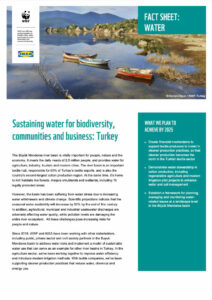Sustaining water for biodiversity, communities and business: Turkey
The Büyük Menderes river basin is vitally important for people, nature and the economy. It meets the daily needs of 2.5 million people, and provides water for agriculture, industry, tourism and modern cities. The river basin is an important textile hub, responsible for 60% of Turkey’s textile exports, and is also the country’s second-largest cotton production region. At the same time, it’s home to rich habitats like forests, maquis shrublands and wetlands, including 10 legally protected areas.
However, the basin has been suffering from water stress due to increasing water withdrawals and climate change. Scientific projections indicate that the seasonal water availability will decrease by 50% by the end of this century. In addition, agricultural, municipal and industrial wastewater discharges are adversely affecting water quality, while pollution levels are damaging the entire river ecosystem. All these challenges pose increasing risks for people and nature.
Since 2019, WWF and IKEA have been working with other stakeholders, including public, private sector and civil society partners in the Buyuk Menderes basin to address water risks and implement a model of sustainable water use that can serve as an example for other river basins in Turkey. In the agriculture sector, we’ve been working together to improve water efficiency and introduce modern irrigation methods. With textile companies, we’ve been supporting cleaner production practices that reduce water, chemical and energy use.
These efforts led to the launch of a regional public grant programme, with six textile companies in the basin receiving US$300,000 to invest in cleaner production, saving 570,000m3 of water and 200,000kWh of energy.
We’ve also carried out studies and raised public awareness of the importance of freshwater ecosystems and the services they provide, including in the Bafa Lake and the Buyuk Menderes Delta. In early 2021, we launched the virtual Journey of Water – a first-of-its-kind awareness campaign in Turkey, taking 5 million followers and web visitors on a virtual tour of the Buyuk Menderes River from source to sea.
What we plan to achieve by 2025
- Create financial mechanisms to support textile producers to invest in cleaner production practices, so that cleaner production becomes the norm in the Turkish textile sector
- Demonstrate water stewardship in cotton production, including regenerative agriculture and modern irrigation pilot projects to enhance water and soil management
- Establish a framework for planning, managing and monitoring water- related issues at a landscape level in the Büyük Menderes basin
What we’re doing
Promoting best practice in textile production
Enterprises in the textile dyeing industry can save money and reduce their environmental footprint through cleaner production practices – but need investment to do so. The 50 dye-houses in the Buyuk Menderes basin could save an estimated US$10 million per year, as well as reducing their water, chemical and energy use, through a variety of interventions, from phasing out harmful chemicals and improving water management, to installing more efficient equipment and infrastructure. We’re facilitating a dialogue between Turkish ministries, exporters associations, chambers of industry and financial institutions to create financial mechanisms for cleaner production investments.
Increasing sustainable textile supply chains
Under the WWF and IKEA partnership, we’re guiding and supporting cotton farmers to improve the quantity and quality of water and protect biodiversity on farmland. A pilot project on regenerative agriculture on 7.9 hectares of farmland that follow the Better Cotton standard aims to improve soil quality and increase the resilience of cotton production. The outcomes of the project will be used to improve agricultural public policies and programmes and generate financial and technical support for farmers.
Through the Cotton Water Stewardship Committee, we’re facilitating a modern irrigation project involving 17 cotton farmers on 95 hectares. We’re expecting this project will lead to 50% savings in irrigated water use, 20% savings in input costs, and a 10kg increase in yield per hectare. With the Committee, we’re advocating for national and regional decision-makers to adopt this modern irrigation approach.
For companies that want to improve their supply chain, traceability and transparency is key. We’re helping establish mechanisms that trace the cotton all the way up from the farm to the end textile product. We help facilitate dialogues between public and private stakeholders with the aim to develop sustainable business models.
Applying a landscape approach in water management
The decline in water quantity and quality is leading to habitat and biodiversity loss in Bafa Lake and the Buyuk Menderes Delta, identified as Key Biodiversity Areas. This is mainly caused by changes in land use and intensive industrial and agricultural practices. The problem is exacerbated by a lack of coordination between the different government institutions responsible for the management of water basins.
WWF and IKEA are facilitating a multistakeholder process to enhance water management in Key Biodiversity Areas. Adopting a landscape approach can benefit biodiversity and support livelihoods including agriculture, ecotourism and sustainable fisheries. Ultimately, we want to see public institutions overcome the current fragmented governance system and adopt an integrated approach to water management in the Buyuk Menderes basin.
For more information
Saba Dar
Water Stewardship Basin Coordinator WWF-Germany
saba.dar@wwf.de
